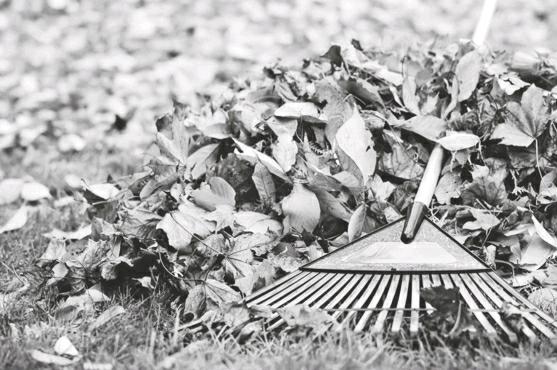耙树叶,吹树叶
2017-05-02ByFrancesA.Miller
By+Frances+A.+Miller
For 16 autumns I had raked by hand the contributions of my own 12 oak trees plus an assortment of other deciduous beauties,2 and often, after a windy day, my neighbors leaves as well.
Although I cant say I rejoiced to see the leaves begin to drift and tumble around my yard,3 I did enjoy the actual raking. Thumb armored with a heavy-duty bandage before I even took the rake down from its hook, blue tarp ready for loading, Welsh Corgi barking and bouncing enthusiastically around my knees, I would head out to engage the natural world in my annual ritual.4
Raking leaves, like Christmas, has its own storehouse of welcome memories, unleashed each fall by the simple act of taking rake in hand.5 Memories of flinging oneself into giant leaf piles, of the smell of burning leaves, of my California-raised children discovering autumn in the leaves piled high in my Virginia sisters driveway and knowing instinctively what to do.6
Nothing changes over the years. The crinkly paper swish of the rake through the leaves, the dusty nosetickling smell, the swirling colors of fall flying off the end of the rake, and the rhythmic background beat in my head of either—depending on enthusiasm and energy level—“Raindrops Keep Fallin on My Head” or “This Old Man”all are there waiting to be enjoyed again.7
Like those who see themselves as one of two kinds of people in the world (and always, of course, the better of the two), I had an undeniably superior attitude toward my leaf-blowing neighbors. I pitied them for missing out on all the delights of raking, scorned them for polluting the air with gas fumes, and hated the horrible high-pitched whine that pierced the walls of my house and found its way into my skull.8 In darker moments I wondered if they were purposefully trying to drive me mad.
Last fall I was visiting family and returned home to weeks of accumulated layers of scarlet and gold—20 tarps worth to be loaded and dragged to the curb.9 So, reluctantly, to get the job done before winter, I borrowed a leaf blower. At least it was electric, but even with earplugs10, it was too noisy for singing. The cord tangled around my ankles and grabbed every root and branch it could find.11 The plug pulled out of the blower handle at least once a minute,12 and—worst of all—there were no delight-filled memories. Leaf blowers were never part of my childhood.
My resulting mood could only be described as grouchy13.
But as I settled in, I found a sweeping movement that worked well.14 I learned how to corral the leaping leaves that a casual movement of the blower would unintentionally send racing in undesired directions.15
New images presented themselves: myself as a sheepdog or maybe Babe, the pig, at a sheep-herding trial; a cowboy rounding up a herd of skittish cattle; a scuba diver swimming slowly behind a school of bright-colored tropical fish.16
Noticing a neighbor getting ready to use his blower, I went over to ask for tips on technique and enjoyed a 20-minute conversation with someone Id lived across the street from for five years. Wed exchanged only hellos and waves before. Discovering we were both fans of classic movies, I left promising to exchange DVDs.
At the end of the day, I had two enormous leaf piles on the curb, a totally cleared yard, sore17 arms (but a bandagefree thumb), and the realization that I had enjoyed myself.
There are two kinds of people in this world: leaf-rakers and leaf-blowers. I thought I was a confirmed leaf-raker, one of the “good guys,” ecologically and nostalgically.18 I saw leaf-blowers as lazy and thoughtless. But now, instead of being firmly in one camp looking down on members of the other, I have somehow become a member of both. So has my neighbor. Yesterday he came over to borrow a rake.
When political signs started going up around the neighborhood, I found myself automatically making rude assumptions about the people who were clearly in the wrong camp. And then I began to wonder what would happen if I walked across the street, rang the bell, and said, “Hi, neighbor.”Could we get acquainted, find some common ground?19 I think its worth a try.
1. raker: 用耙子耙的人,來自动词rake(耙)。
2. oak: 橡树;an assortment of: 各式各样的;deciduous: 落叶的。
3. rejoice: 感到欣喜;drift: 飘,游荡;tumble: 坠落,翻滚。
4. 在还没从挂钩上取下耙子之前,我就把拇指包上了耐用的绷带,备好蓝色防水帆布准备装树叶用,我的威尔士柯基犬热切地围在我膝边又叫又跳,我即将开始这一年一度亲近自然世界的仪式。armor: v. 为……装甲,为……提供防御;heavy-duty: 耐用的;hook: 挂钩;tarp: 防水帆布。
5. storehouse: 仓库,喻指“宝库”;unleash:放开。
6. 那些回忆包括将自己奋力投进巨大的落叶堆里、叶子燃烧发出的气味,以及我几个在加州长大的孩子住在弗吉尼亚州我姐姐家时,在车道高高的落叶堆里发现了秋天,并本能地知道做些什么。fling oneself into: 全力投入。
7. 耙子在落叶间发出的褶皱纸张摩擦般的沙沙声、让人鼻子发痒的灰尘味、在耙子下面飞散的秋日绚彩、在我的脑海里跳动的背景乐节奏——是《雨点不断打在我头上》还是《这位老人》要视乎热情和精力而定——所有这一切都在等着再次被体验。crinkly: 褶皱的;swish: 刷刷声,沙沙声;tickle: 使人发痒;swirling: 旋转的。
8. miss out on: 错失;scorn: 轻蔑,鄙视;fumes: [复](有害或难闻的)烟,气;high-pitched: 高(尖)声的;whine:哀鸣;pierce: 刺穿;skull: 头骨。因为吹叶机使用汽油,内燃机燃烧不充分会产生污染,故作者有此说。
9. accumulated: 积攒的,积累的;layer:层;scarlet and gold: 绯红色和金色(的树叶);curb: 路边。
10. earplug: 耳塞。
11. (机器的)细绳缠在我的脚踝上,绕住它碰到的每一个树根和树枝。tangle: 缠结。
12. plug: 插头;handle: 把手,柄。
13. grouchy: 有怨气的,不高兴的。
14. settle in: 适应,习惯于;sweeping: 打扫的,清扫的。
15. corral: 把……集合在一起;leaping: 跳跃的;undesired: 不希望的,不想要的。
16. 如今新形象呈现了:我仿佛是尝试着牧羊的牧羊犬或小猪贝贝,一个正在把胆小的牛群赶在一起的牛仔,或是一个戴着水肺、正慢慢游在一群色彩鲜艳的热带鱼后面的潜水员。Babe: 源自电影《猪宝贝》(Babe, the Gallant Pig),讲述小猪贝贝努力成为一只牧羊猪的故事;sheepherd: 放牧;trial: 尝试,试验;round up:赶拢,使集中;herd: 兽群,牧群;skittish:胆小的,易受惊的;scuba: 自携式水下呼吸器,水肺;school: 鱼群。
17. sore: 酸痛的。
18. ecologically: 生态保护地;nostalgically: 怀旧地。
19. acquainted: 熟悉的,认识的;common ground: 共同点。
